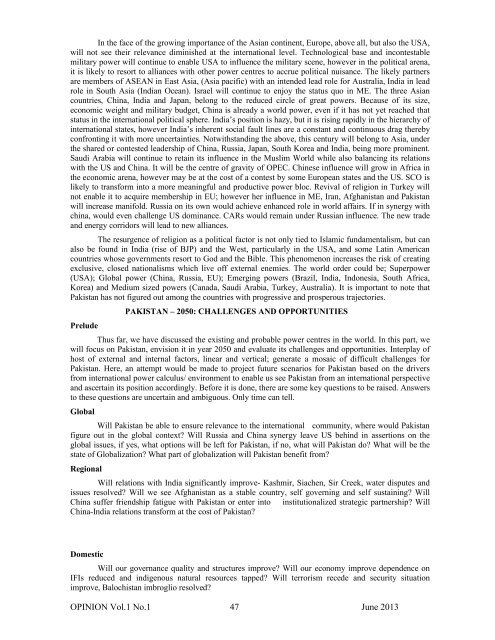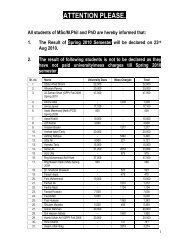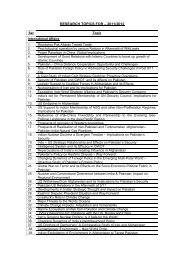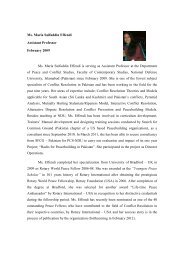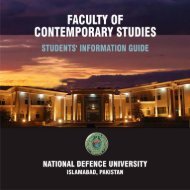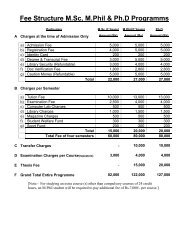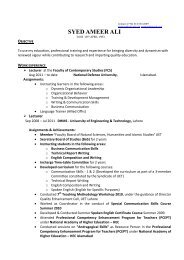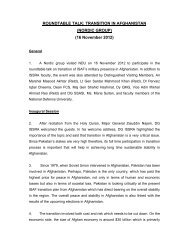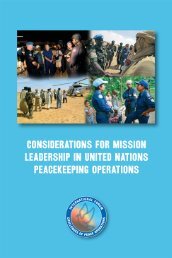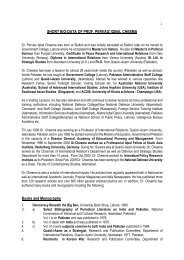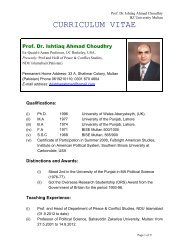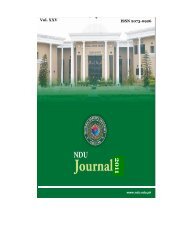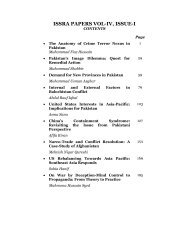OPINION Vol.1, No.1 June 2013 - National Defence University
OPINION Vol.1, No.1 June 2013 - National Defence University
OPINION Vol.1, No.1 June 2013 - National Defence University
You also want an ePaper? Increase the reach of your titles
YUMPU automatically turns print PDFs into web optimized ePapers that Google loves.
In the face of the growing importance of the Asian continent, Europe, above all, but also the USA,<br />
will not see their relevance diminished at the international level. Technological base and incontestable<br />
military power will continue to enable USA to influence the military scene, however in the political arena,<br />
it is likely to resort to alliances with other power centres to accrue political nuisance. The likely partners<br />
are members of ASEAN in East Asia, (Asia pacific) with an intended lead role for Australia, India in lead<br />
role in South Asia (Indian Ocean). Israel will continue to enjoy the status quo in ME. The three Asian<br />
countries, China, India and Japan, belong to the reduced circle of great powers. Because of its size,<br />
economic weight and military budget, China is already a world power, even if it has not yet reached that<br />
status in the international political sphere. India’s position is hazy, but it is rising rapidly in the hierarchy of<br />
international states, however India’s inherent social fault lines are a constant and continuous drag thereby<br />
confronting it with more uncertainties. Notwithstanding the above, this century will belong to Asia, under<br />
the shared or contested leadership of China, Russia, Japan, South Korea and India, being more prominent.<br />
Saudi Arabia will continue to retain its influence in the Muslim World while also balancing its relations<br />
with the US and China. It will be the centre of gravity of OPEC. Chinese influence will grow in Africa in<br />
the economic arena, however may be at the cost of a contest by some European states and the US. SCO is<br />
likely to transform into a more meaningful and productive power bloc. Revival of religion in Turkey will<br />
not enable it to acquire membership in EU; however her influence in ME, Iran, Afghanistan and Pakistan<br />
will increase manifold. Russia on its own would achieve enhanced role in world affairs. If in synergy with<br />
china, would even challenge US dominance. CARs would remain under Russian influence. The new trade<br />
and energy corridors will lead to new alliances.<br />
The resurgence of religion as a political factor is not only tied to Islamic fundamentalism, but can<br />
also be found in India (rise of BJP) and the West, particularly in the USA, and some Latin American<br />
countries whose governments resort to God and the Bible. This phenomenon increases the risk of creating<br />
exclusive, closed nationalisms which live off external enemies. The world order could be; Superpower<br />
(USA); Global power (China, Russia, EU); Emerging powers (Brazil, India, Indonesia, South Africa,<br />
Korea) and Medium sized powers (Canada, Saudi Arabia, Turkey, Australia). It is important to note that<br />
Pakistan has not figured out among the countries with progressive and prosperous trajectories.<br />
Prelude<br />
PAKISTAN – 2050: CHALLENGES AND OPPORTUNITIES<br />
Thus far, we have discussed the existing and probable power centres in the world. In this part, we<br />
will focus on Pakistan, envision it in year 2050 and evaluate its challenges and opportunities. Interplay of<br />
host of external and internal factors, linear and vertical; generate a mosaic of difficult challenges for<br />
Pakistan. Here, an attempt would be made to project future scenarios for Pakistan based on the drivers<br />
from international power calculus/ environment to enable us see Pakistan from an international perspective<br />
and ascertain its position accordingly. Before it is done, there are some key questions to be raised. Answers<br />
to these questions are uncertain and ambiguous. Only time can tell.<br />
Global<br />
Will Pakistan be able to ensure relevance to the international community, where would Pakistan<br />
figure out in the global context Will Russia and China synergy leave US behind in assertions on the<br />
global issues, if yes, what options will be left for Pakistan, if no, what will Pakistan do What will be the<br />
state of Globalization What part of globalization will Pakistan benefit from<br />
Regional<br />
Will relations with India significantly improve- Kashmir, Siachen, Sir Creek, water disputes and<br />
issues resolved Will we see Afghanistan as a stable country, self governing and self sustaining Will<br />
China suffer friendship fatigue with Pakistan or enter into institutionalized strategic partnership Will<br />
China-India relations transform at the cost of Pakistan<br />
Domestic<br />
Will our governance quality and structures improve Will our economy improve dependence on<br />
IFIs reduced and indigenous natural resources tapped Will terrorism recede and security situation<br />
improve, Balochistan imbroglio resolved<br />
<strong>OPINION</strong> <strong>Vol.1</strong> <strong>No.1</strong> 47 <strong>June</strong> <strong>2013</strong>


